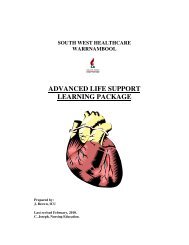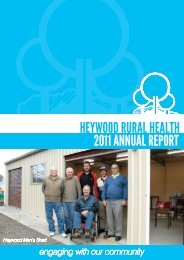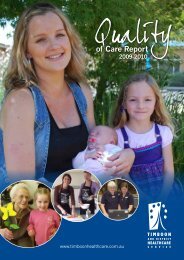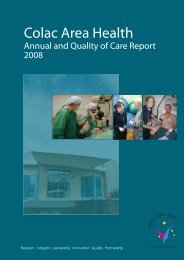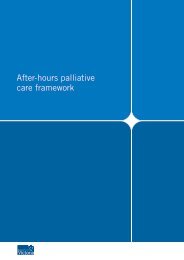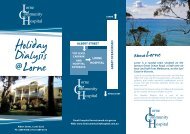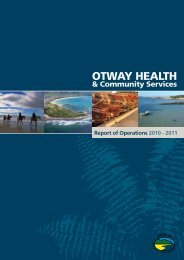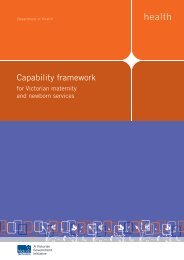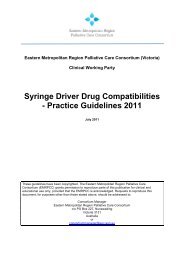Self Directed Learning Package - University of Queensland
Self Directed Learning Package - University of Queensland
Self Directed Learning Package - University of Queensland
- No tags were found...
Create successful ePaper yourself
Turn your PDF publications into a flip-book with our unique Google optimized e-Paper software.
102 • The Palliative Approach ToolkitWhat is your role when a resident requiresterminal care?Key PointIt is the nurse’s role to initiate the use <strong>of</strong> the RACEoLCP.GP agreement must be obtained and the familyneeds to be contacted.Your role as a senior nurse also includes working through thecare management page <strong>of</strong> section three which prompts you toreview and plan for:• spiritual/religious/cultural needs• communication with family members• comfort planning.The PA Toolkit and introductory education package outline indetail how to use the End <strong>of</strong> Life Care Pathway. We will now focuson some other related issues that more senior and experiencednurses are more likely to have to deal with at this time.Cultural considerationsAustralia has a rich multicultural population.Culture refers to a set <strong>of</strong> beliefs, values, norms and practicesthat are learned, shared, and dynamic. They influence people’sthoughts, expressions and actions in a patterned way.Residents and family members from culturally and linguisticallydiverse populations may have particular needs that members<strong>of</strong> the aged care team should address in order to provide acompassionate and effective palliative approach to care. Thesemay become increasingly important as the resident enters theterminal phase.Thinking PointWhat cultural groups are represented in the residentsand staff at your facility?Key pointJust because someone was born in a particularcountry or speaks a different language does notmean that we can assume their religious, spiritual orsocial rituals and preferences are the same as thosedescribed in a reference book. ALWAYS seek thisinformation early to avoid problems.Grief and bereavementWhen a resident dies, loss and grief may be experienced by theaged care team, the family, and other residents.Loss is the severing or breaking <strong>of</strong> an attachment to someone orsomething, resulting in a changed relationship.Grief is the normal response to loss. It includes a range <strong>of</strong>responses: physical, mental, emotional and spiritual. They areusually associated with unhappiness, anger, guilt, pain andlonging for the person or thing.Bereavement is the total reaction to a loss and includes theprocess <strong>of</strong> healing or ‘recovery’ from the loss. Each person willgrieve and recover in their own way.Case study: JudyJudy has been a resident <strong>of</strong> your facility for four months.Judy’s husband Paul is being cared for by their daughterRhonda and her husband Derek. Paul suffered a stroke anumber <strong>of</strong> years ago and is becoming increasing confusedand distressed because he misses his wife and is showingsigns <strong>of</strong> early dementia.Rhonda is working full time but has taken long service leaveto care for her father. Rhonda has a history <strong>of</strong> alcohol abusewhich has strained family relationships in the past and sheand Rhonda were estranged for nearly 20 years. In the fouryears since they have been reconciled, there have beenintermittent periods <strong>of</strong> tension but Rhonda has worked hardat being a responsible daughter and parent.Judy is expected to die within the next week. You haveconcerns about how her daughter Rhonda will handle Judy’sdeath. Rhonda has been expressing a great deal <strong>of</strong> guiltfor the pain she caused her mother with her alcohol abuse.You also know Rhonda is dealing with a lot <strong>of</strong> stress in herimmediate family, including a daughter-in-law’s cancerdiagnosis. Rhonda has been snapping at the staff in yourfacility. She also becomes quite distressed and teary whenyou update her on her mother’s condition.ActivityComplete a Modified Bereavement Risk Index forRhonda using the form on the next page. Based onRhonda’s score what support would you <strong>of</strong>fer?



